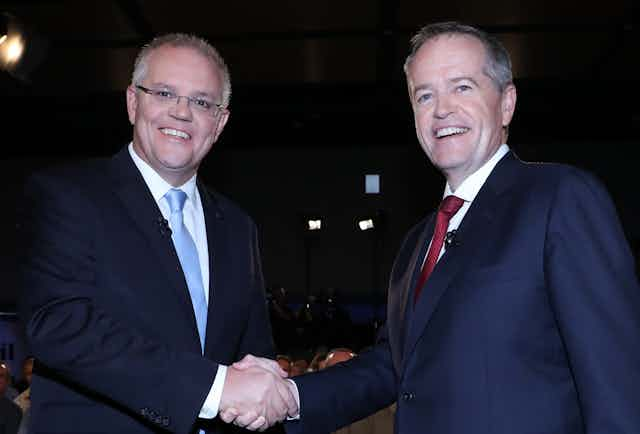Bill Shorten’s many town hall meetings stood him in good stead in the Sky “people’s forum” in Brisbane on Friday night.
His engagement with the audience was more direct than Scott Morrison’s, and he packed multiple references to his promises into his answers.
Shorten was forceful, especially on the topic of Labor’s plan to cancel cash refunds from franking credits, a policy that is troublesome for the opposition. He insisted on getting enough opportunity to explain his arguments and would not be shut down by moderator David Speers until he had made his points comprehensively.
When it comes to offerings for the future, Morrison has much less in his kit bag than Shorten, so his emphasis was on defending the government’s record.
As in Monday night’s Perth debate, Morrison was on top of his facts and figures. Shorten, for his part, seemed better prepared than in their first encounter, when he was caught short a couple of times.
Like Shorten, Morrison was assertive, in his case physically as well as verbally. This produced the “line” of the night, when in response to Morrison moving close in Shorten declared him “a classic space invader”.
Those who claimed it was a “Latham moment” – a reference to Mark Latham’s famous fierce shaking of John Howard’s hand in the 2004 campaign – have over-vivid imaginations. Shorten’s quip played to the crowd - and he got a laugh.
The audience of 109 undecided voters broke almost evenly between the two leaders: 43% favoured Shorten, 41% Morrison, while 16% remained undecided after the hour’s encounter. Shorten’s “win” in the room was by a much smaller margin than he scored with the Perth studio audience.
As often happens with this “forum” format, the questions were an eclectic mix, ranging from education and climate change to the plight of local post offices. On the latter, Shorten mused that ways could be found to give these small businesses the ability to compete with the banks in regional areas, though he conceded he didn’t have a policy to do so.
One questioner suggested people should be able to determine how their tax was spent. Another was concerned about religious freedom, specifically that of Christians to speak in public forums about their beliefs on matters such as abortion and same-sex marriage.
When the subject of youth mental health came up, Shorten asked people to put up their hands if they’d known a family affected by suicide. Morrison was among the many who did so.
There were moments of agreement on topics such as mental health and sexual assault.
But inevitably much of the discussion and many of the clashes focused on money and tax. The conflicting arguments have been well rehearsed throughout the campaign.
Read more: Leaders try to dodge them. Voters aren't watching. So, are debates still relevant?
Morrison dwelt on his theme of the need to manage money to pay for priorities. “If you can’t control your taxes you can’t control your spending.” Shorten’s pitch was familiar too. “The economy is not working in the interests of working and middle class people” .
Shorten said that his government would look at “across the board” tax cuts when the budget could afford it. (This is how he covers that glitch on the campaign trail when he held out the prospect to one worker that Labor would give a tax cut to high income earners – although its policy is to reject the Coalition’s high-end tax relief.)
He flagged that Sunday’s Labor launch will promise a further crackdown on multi-nationals’ tax avoidance.
Labor will release its costings on Thursday or Friday of next week, he said, with bigger surpluses than in the budget. Labor planned “to have a budget surplus each year we are in government”.
Plans for a third debate remain fluid.

